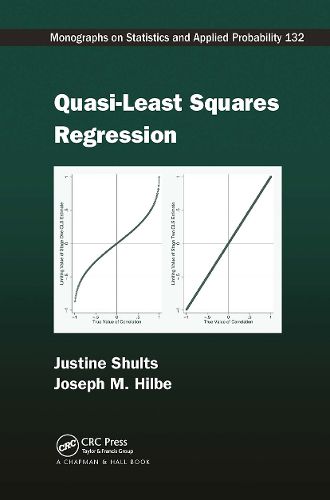Readings Newsletter
Become a Readings Member to make your shopping experience even easier.
Sign in or sign up for free!
You’re not far away from qualifying for FREE standard shipping within Australia
You’ve qualified for FREE standard shipping within Australia
The cart is loading…






Drawing on the authors' substantial expertise in modeling longitudinal and clustered data, Quasi-Least Squares Regression provides a thorough treatment of quasi-least squares (QLS) regression-a computational approach for the estimation of correlation parameters within the framework of generalized estimating equations (GEEs). The authors present a detailed evaluation of QLS methodology, demonstrating the advantages of QLS in comparison with alternative methods. They describe how QLS can be used to extend the application of the traditional GEE approach to the analysis of unequally spaced longitudinal data, familial data, and data with multiple sources of correlation. In some settings, QLS also allows for improved analysis with an unstructured correlation matrix.
Special focus is given to goodness-of-fit analysis as well as new strategies for selecting the appropriate working correlation structure for QLS and GEE. A chapter on longitudinal binary data tackles recent issues raised in the statistical literature regarding the appropriateness of semi-parametric methods, such as GEE and QLS, for the analysis of binary data; this chapter includes a comparison with the first-order Markov maximum-likelihood (MARK1ML) approach for binary data.
Examples throughout the book demonstrate each topic of discussion. In particular, a fully worked out example leads readers from model building and interpretation to the planning stages for a future study (including sample size calculations). The code provided enables readers to replicate many of the examples in Stata, often with corresponding R, SAS, or MATLAB (R) code offered in the text or on the book's website.
$9.00 standard shipping within Australia
FREE standard shipping within Australia for orders over $100.00
Express & International shipping calculated at checkout
Drawing on the authors' substantial expertise in modeling longitudinal and clustered data, Quasi-Least Squares Regression provides a thorough treatment of quasi-least squares (QLS) regression-a computational approach for the estimation of correlation parameters within the framework of generalized estimating equations (GEEs). The authors present a detailed evaluation of QLS methodology, demonstrating the advantages of QLS in comparison with alternative methods. They describe how QLS can be used to extend the application of the traditional GEE approach to the analysis of unequally spaced longitudinal data, familial data, and data with multiple sources of correlation. In some settings, QLS also allows for improved analysis with an unstructured correlation matrix.
Special focus is given to goodness-of-fit analysis as well as new strategies for selecting the appropriate working correlation structure for QLS and GEE. A chapter on longitudinal binary data tackles recent issues raised in the statistical literature regarding the appropriateness of semi-parametric methods, such as GEE and QLS, for the analysis of binary data; this chapter includes a comparison with the first-order Markov maximum-likelihood (MARK1ML) approach for binary data.
Examples throughout the book demonstrate each topic of discussion. In particular, a fully worked out example leads readers from model building and interpretation to the planning stages for a future study (including sample size calculations). The code provided enables readers to replicate many of the examples in Stata, often with corresponding R, SAS, or MATLAB (R) code offered in the text or on the book's website.